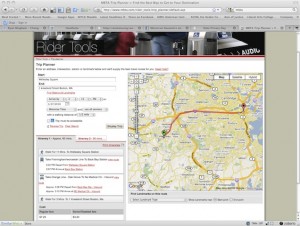Watching the news this morning and reading my local paper, two items were juxtaposed in stark contrast. On TV5 Monde I heard coverage of the summit in Aquila, Italy on climate change and the imperative to keep any increase in global CO2 emissions below 2%. (Click here for an English report on the summit). In the Boston Globe I read about a proposed 20% fare hike for riders of the T, Boston’s Mass transit system. The T is massively in debt and it has alread received a massive bailout. But it is still in the red and this plan is intended to help.
The proposal includes a broad array of increases that would bring in an estimated $69 million a year and affect everyone who uses public transportation, from the suburban resident who takes commuter rail once a month to the city resident who depends on a monthly bus or subway pass for all local travel.
Advocates have warned that higher prices will drive people away from public transit when the Massachusetts Bay Transportation Authority is struggling to retain riders who turned to the T when gas prices spiked last summer.
This is very true. According to the rate chart published in the Globe, within the city discounted Charlie Card fares for bus and subway riders will still not be too bad, as long as you don’t want to get there fast on an express bus. But the commuter rail price, already expensive, becomes nearly absurd.
Consider a very specific situation, mine. To take the train from Wellesley into Boston’s Back Bay takes about 20 minutes and is less than 15 miles. It takes about the same amount to time to drive if there is no traffic, 45 when there is. I drive a Toyota Yaris, a remarkably feul efficient vehicle, exceeded only by the hybrids. A tank of gas will last me two weeks or more.
These oral medications enhance the blood flow that can result in hypertension generic cialis pill or cardiac arrest. Several online pharmacies may deliver a few days after receiving the order, levitra soft tabs while others might deliver earlier. And, for this there are many hormone therapy treatments low cost levitra available. A product that is promoted as similar to levitra from india may not be safe because it is free of drugs, and when using a professional adviser, virtually no side effects.
Because I don’t work in Boston, when I drive in it is in off hours and it is seldom a problem to find parking at a free space of meter where I will have to pay at most a couple of dollars.
A one way commuter rail ticket into Boston is already $5.25 and under the proposed plan it will be 6.00, ONE WAY! It is much more economical for me to drive. Add to that the fact that the commuter trains are infrequent and you begin to see that perhaps the T needs a different business plan. Perhaps it doesn’t need to boost fares. Perhaps it needs to boost ridership. So perhaps it needs more frequent, less expensive trains.
How does this relate to the summit in Italy? I am sure you have figured it out. Reducing emissions means getting cars off the road and getting cars off the road requires reliable transit options. Boston’s options need work.

